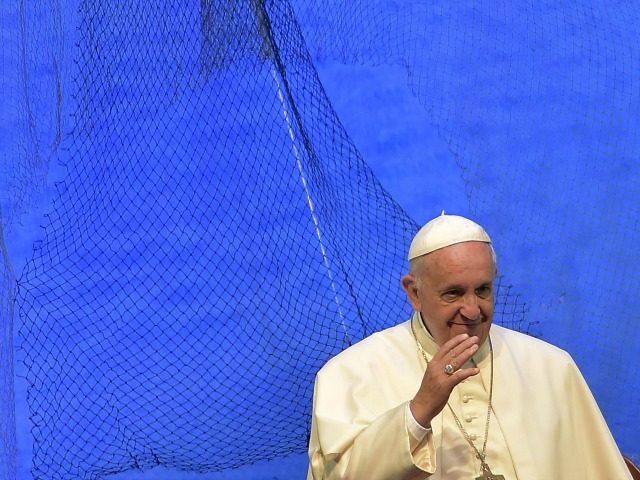In his weekly General Audience Wednesday, Pope Francis had hard words for those who go through life “pretending not to see” the poor, declaring that those who disregard the poor show disdain for God at the same time.
In his words addressed to the tens of thousands gathered in Saint Peter’s Square, the Pope offered a reflection on Jesus’ parable of the rich man and Lazarus, which presents the parallel lives of a man who lives in opulent wealth and a poor man covered with sores who lies at the rich man’s gate. Both eventually die and the rich man is condemned while the poor man finds salvation.
This reading from Luke’s gospel teed up one of the Pope’s favorite themes: that of care for the poor and the need to overcome a “throwaway culture” steeped in waste.
“Lazarus,” the Pope said, “represents the silent cry of the poor of all time and the contradiction of a world where vast wealth and resources are in the hands of the few.”
The striking thing about the rich man in the parable, Francis said, is that his “front door is always closed to the poor.” And yet, the Pope said, “if I do not throw open the door of my heart to the poor, that door is closed. Even for God.”
During his life, the rich man “showed no consideration for God but made himself the center of everything, locked in his own world of luxury and waste,” Francis said. “In excluding Lazarus, he took no account either of the Lord or his law. To ignore the poor is to scorn God!”
Francis also pointed out that in the story, the rich man has no proper name, only an adjective: “rich.” Lazarus, on the other hand, is called by name no less than five times, underscoring how precious he is in the sight of God.
The name “Lazarus,” Francis said, “means ‘God helps.’ Lying before the door, Lazarus is a living reminder of the rich man to remember God, but the rich man does not heed the summons.”
The Pope was careful to point out that in the parable the rich man “is condemned not for his wealth, but he was unable to feel compassion for Lazarus and come to his assistance.”
Only after death, Francis continued, does the rich man “seem to see Lazarus for the first time,” and he asks Abraham to send Lazarus to dip the tip of his finger in water to cool his tongue. Now, the tables are turned and it is the rich man who must turn to the poor man for help “while in life he pretended not to see him,” Francis said.
“How many times so many people pretend not to see the poor! For them, the poor do not exist,” he said.
Abraham responds that he can do nothing to help the man at this point, thus providing “the key to the whole story.” Abraham “explains that good and evil have been distributed to compensate earthly injustice, and the door that separated the rich from the poor in life, has turned into ‘a great abyss.’ As long as Lazarus was in front of his house, there was a chance of salvation for the rich man,” Francis added, “but now that they are both dead, the situation has become irreparable.”
And thus, “the parable clearly warns us that God’s mercy toward us is linked to our mercy towards our neighbor. When our mercy is lacking, his mercy can find no place in our closed heart and cannot enter. If I do not throw open the door of my heart to the poor, that door stays closed. Even to God. And this is terrible,” he said.
The Pope concluded his reflection by saying that “the mystery of our salvation is hidden in the reversal of fortunes that the parable describes, in which Christ unites poverty with mercy.”
Follow Thomas D. Williams on Twitter

COMMENTS
Please let us know if you're having issues with commenting.